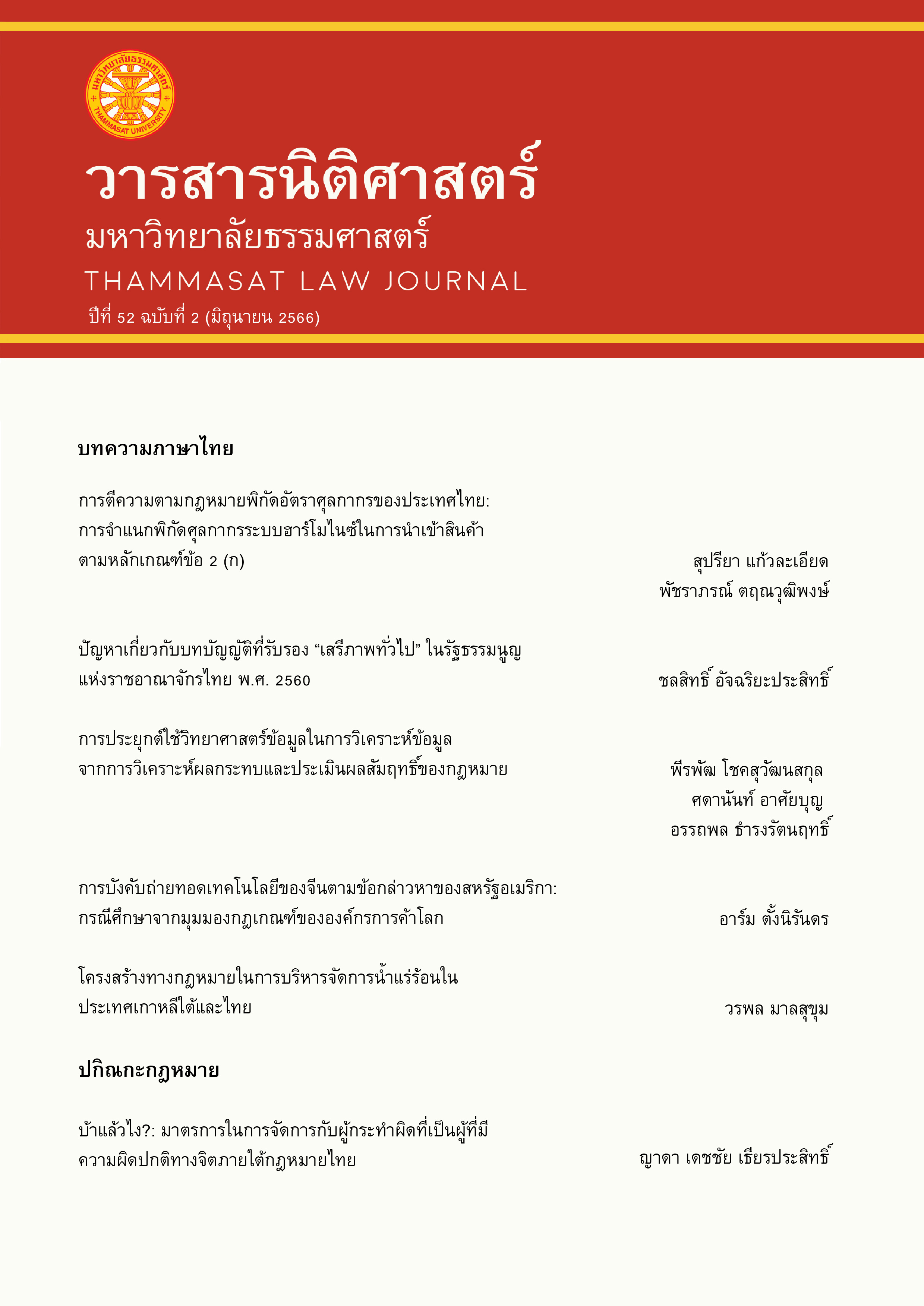การบังคับถ่ายทอดเทคโนโลยีของจีนตามข้อกล่าวหาของสหรัฐอเมริกา: กรณีศึกษาจากมุมมองกฎเกณฑ์ขององค์การการค้าโลก
คำสำคัญ:
การบังคับถ่ายทอดเทคโนโลยี, สงครามการค้า, กฎเกณฑ์ขององค์การการค้าโลกบทคัดย่อ
หนึ่งในพฤติกรรมการค้าที่ไม่เป็นธรรมของจีนตามข้อกล่าวหาของสหรัฐฯ คือนโยบายการบังคับถ่ายทอดเทคโนโลยี ซึ่งเป็นสาเหตุสำคัญที่นำมาสู่สงครามการค้าระหว่างจีนและสหรัฐฯ การบังคับถ่ายทอดเทคโนโลยีของจีนตามข้อกล่าวหาของสหรัฐฯ อาจแบ่งได้เป็นสองรูปแบบ ได้แก่ การบังคับถ่ายทอดเทคโนโลยีผ่านกระบวนการทางปกครองและการบังคับถ่ายทอดเทคโนโลยีผ่านกฎเกณฑ์เรื่องการร่วมทุนของต่างชาติในบางกิจการ กฎเกณฑ์ขององค์การการค้าโลกในปัจจุบันมีบทบัญญัติที่เกี่ยวข้องกับการบังคับถ่ายทอดเทคโนโลยีเพียงบางรูปแบบเท่านั้น และแม้ในกรณีที่มีบทบัญญัติของกฎเกณฑ์ที่เกี่ยวข้อง ก็อาจมีปัญหาในการบังคับใช้กฎเกณฑ์ ซึ่งเกิดจากปัญหามาตรฐานการพิสูจน์และปัญหาการเชื่อมโยงความรับผิดจากเอกชนสู่รัฐ ส่งผลให้กลไกขององค์การการค้าโลกยากที่จะเปลี่ยนแปลงพฤติกรรมของจีนในเรื่องการบังคับถ่ายทอดเทคโนโลยี จนนำมาสู่ความพยายามของสหรัฐฯ ในการกดดันจีนผ่านสงครามการค้า
เอกสารอ้างอิง
หนังสือ
Dan Prud’homme and Taolue Zhang, China’s Intellectual Property Regime for Innovation: Risks to Business and National Development Springer International Publishing 2019).
Lv Liu, Rongfang Liu and Zhaodong Huang, 'High Speed Rail Development in China: A Case Study of State-Guided Technology Transfer’ ใน China as an Innovation Nation (Oxford University Press 2016).
บทความ
Alan Sykes, ‘The Law and Economics of 'Forced' Technology Transfer and Its Implications for Trade and Investment Policy (and the U.S.-China Trade War)’ (2021) 13 Journal of Legal Analysis 127.
Geraldo Vidigal, ‘Attribution in the WTO: The Limits of ‘Sufficient Government Involvement’’ (2017) 6 Journal of International Trade and Arbitration Law 133.
Graham Cook, ‘Defining the Standard of Proof in WTO Dispute Settlement Proceedings: Jurists' Prudence and Jurisprudence’ (2012) 1 Journal of International Trade and Arbitration Law 50.
Julia Ya Qin, ‘Forced Technology Transfer and the US-China Trade War: Implications for International Economic Law’ (2019) 22 Journal of International Economic Law 743.
Jyh-An Lee, ‘Forced Technology Transfer in the Case of China’ (2020) 26 Boston University Journal of Science & Technology Law 324.
Kevin C. Kennedy, ‘A WTO Agreement on Investment: A Solution in Search of a Problem?’ (2003) SSRN Electronic Journal 77.
Mark Wu, ‘The 'China, Inc.' Challenge to Global Trade Governance’ (2016) 57 Harvard International Law Journal 1001.
รายงาน
China Manufacturing 2025: Putting Industrial Policy Ahead of Market Forces, China Manufacturing 2025 2017.
Information Office of the State Council in China, The Facts and China’s Position on China-US Trade Friction 2018.
Office of the United States Trade Representative, Findings of the Investigation into China’s Acts, Policies, and Practices Related to Technology Transfer, Intellectual Property, and Innovation under Section 301 of the Trade Act of 1974 2018.
Office of the United States Trade Representative, 2018 Report to Congress On China’s WTO Compliance 2019.
Office of the United States Trade Representative, Update Concerning China’s Acts, Policies and Practices Related to Technology Transfer, Intellectual Property, and Innovation 2018.
The State Council Information Office of The People’s Republic of China, China’s Position on the China-US Economic and Trade Consultations 2019.
คำตัดสินระหว่างประเทศ
Argentina-Measures Affecting the Importation of Goods (Appellate Body Report) (2015) World Trade Organization WT/DS438, 444, 445/ab/r.
China – Measures Affecting Trading Rights and Distribution Services for Certain Publications and Audiovisual Entertainment Products (Appellate Body Report) (2009) World Trade Organization WT/DS/363/AB/R.
Japan - Trade in Semi-Conductors (GATT Panel Report) (1988) GATT.
US-Antidumping Measures on Certain Hot-Rolled Steel Products from Japan (Panel Report) (2001) World Trade Organization WT/DS184/R.
World Trade Organization ‘China – Certain Measures Concerning the Protection of Intellectual property Rights, Request for Consultations by the United States’(2018) WT/DS542/1.
World Trade Organization ‘China – Certain Measures on the Transfer of Technology, Request for Consultations by the European Union’(2019) WT/DS549/1/Rev.1.
สนธิสัญญา
Agreement on Trade-Related Aspects of Intellectual Property Rights (TRIPS)
Comprehensive and Progressive Agreement for Tran-Pacific Partnership (CPTPP).
Economic and Trade Agreement Between the Government of the United States of America and the Government of the People’s Republic of China (United States-China) (January 15, 2020) (Phrase One Agreement).
General Agreement on Tariffs and Trade (GATT)
General Agreement on Trade in Services (GATS)
North American Free Trade Agreement (NAFTA)
เอกสารองค์การระหว่างประเทศ
EU’s Proposals on WTO Modernization (July 5, 2018).
World Trade Organization Protocol on the Accession of the People’s Republic of China (November 10 2001) WT/L/432.
เอกสารระหว่างการศึกษา
Mark Wu, ‘Managing the China Trade Challenge: Confronting the Limits of the WTO’ (2020) Working Paper for the Penn Project on the Future of U.S.-China Relations (Working Paper).
เว็บไซต์
สมเกียรติ ตั้งกิจวานิชย์, ‘คิดยกกำลังสอง: เคล็ดวิชา…พัฒนารถไฟความเร็วสูงจีน’ (Thailand Development Research Institue), <https://tdri.or.th/2017/07/thinkx2-203/> สืืบค้นเมื่อ 21 พฤศจิกายน 2565.
Anjani Trivedi, ‘Behind the Myth of China’s Great Technology Grab: The Issue of Forced Technology Transfer is Overrated. Carmakers know how to safeguard their most advanced know-how’ Bloomberg (December 23, 2018) สืบค้นเมื่อ 18 ตุลาคม 2565.
Jane Cai and Keegan Elmer, ‘Is the US right to cry foul about forced technology transfer to do business in China – and what is Beijing’s
position?’ South China Morning Post (January 10, 2019) สืบค้นเมื่อ 21 พฤศจิกายน 2565.
Julie Wernau, ‘Forced Tech Transfers Are on the Rise in China, European Firms Say’ The Wall Street Journal (May 20, 2019) สืบค้นเมื่อ 15 ธันวาคม 2565.
Lingling Wei and Bob Davis, ‘How China Systematically Pries Technology from US Companies, ’ The Wall Street Journal (September 26, 2018 ) <https://www.wsj.com/articles/how-china-systematically-pries-technology-from-u-s-companies-1537972066> สืืบค้นเมื่อ 15 กันยายน 2565.
Office of the U.S. Trade Representative, ‘Free Trade Agreements’ <https://ustr.gov/trade-agreements/free-trade-agreements> สืบค้นเมื่อ 21 พฤศจิกายน 2565.
Office of the United States Trade Representative, ‘United States and China Reach Phase One Trade Agreement’ (December 13, 2019) <https://ustr.gov/about-us/policy-offices/press-office/press-releases/2019/december/united-states-and-china-reach> สืบค้นเมื่อ 18 ตุลาคม 2565.
Office of the United States Trade Representative, ‘USTR Announces Next Steps on Proposed 10 Percent Tariff on Imports from China’ (August 13, 2019) <https://ustr.gov/about-us/policy-offices/press-office/press-releases/2019/august/ustr-announces-next-steps-proposed> สืบค้นเมื่อ 18 ตุลาคม 2565.
Office of the United States Trade Representative, ‘USTR Finalizes Tariffs on $200 Billion of Chinese Imports in Response to China’s Unfair Trade Practices’ (September 18, 2019) <https://ustr.gov/about-us/policy-offices/press-office/press-releases/2018/september/ustr-finalizes-tariffs-200> สืบค้นเมื่อ 21 พฤศจิกายน 2565.
Wendy Wu, ‘US ‘lacks evidence’ for forced tech transfers claim against China at WTO’ South China Morning Post (March 29, 2018) <https://www.scmp.com/news/china/diplomacy-defence/article/2139544/us-lacks-evidence-forced-tech-transfers-claim-against> สืบค้นเมื่อ 15 ธันวาคม 2565.
อื่น ๆ
Permanent Mission of the People's Republic of China to the World Trade Organization, Statement by H.E. Ambassador Dr. Zhang Xiangchen at the WTO General Council Meeting 2018.
ดาวน์โหลด
เผยแพร่แล้ว
ฉบับ
ประเภทบทความ
สัญญาอนุญาต
ลิขสิทธิ์ (c) 2023 วารสารนิติศาสตร์ มหาวิทยาลัยธรรมศาสตร์

อนุญาตภายใต้เงื่อนไข Creative Commons Attribution-NonCommercial-NoDerivatives 4.0 International License.
ผลงานที่ตีพิมพ์ในวารสารนิติศาสตร์เป็นลิขสิทธิ์ของวารสารนิติศาสตร์ มหาวิทยาลัยธรรมศาสตร์ และวารสารนิติศาสตร์ มหาวิทยาลัยธรรมศาสตร์ สงวนสิทธิในการเผยแพร่ผลงานที่ตีพิมพ์ในแบบรูปเล่มและทางสื่ออิเล็กทรอนิกส์อื่นใด
บทความหรือข้อความคิดเห็นใด ๆ ที่ปรากฏในวารสารนิติศาสตร์เป็นความรับผิดชอบของผู้เขียนโดยเฉพาะ คณะนิติศาสตร์ มหาวิทยาลัยธรรมศาสตร์ และบรรณาธิการไม่จําเป็นต้องเห็นด้วยหรือร่วมรับผิดชอบใด ๆ



